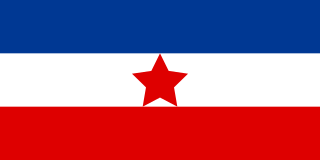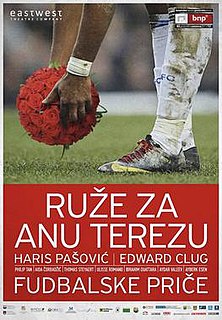
The Balkans, also known as the Balkan Peninsula, are a geographic area in southeastern Europe with various definitions and meanings, including geopolitical and historical. The region takes its name from the Balkan Mountains that stretch throughout the whole of Bulgaria. The Balkan Peninsula is bordered by the Adriatic Sea in the northwest, the Ionian Sea in the southwest, the Aegean Sea in the south, the Turkish Straits in the east, and the Black Sea in the northeast. The northern border of the peninsula is variously defined. The highest point of the Balkans is Mount Musala, 2,925 metres (9,596 ft), in the Rila mountain range, Bulgaria.

Maribor is the second-largest city in Slovenia and the largest city of the traditional region of Lower Styria. It is also the seat of the City Municipality of Maribor, the seat of the Drava statistical region and the Eastern Slovenia region. Maribor is also the economic, administrative, educational, and cultural centre of eastern Slovenia.

Yugoslavia was a country in Southeast Europe and Central Europe for most of the 20th century. It came into existence after World War I in 1918 under the name of the Kingdom of Serbs, Croats and Slovenes by the merger of the provisional State of Slovenes, Croats and Serbs with the Kingdom of Serbia, and constituted the first union of the South Slavic people as a sovereign state, following centuries in which the region had been part of the Ottoman Empire and Austria-Hungary. Peter I of Serbia was its first sovereign. The kingdom gained international recognition on 13 July 1922 at the Conference of Ambassadors in Paris. The official name of the state was changed to Kingdom of Yugoslavia on 3 October 1929.
The Yugoslav First Federal Football League, was the premier football league in the Kingdom of Yugoslavia (1918–1941) and Socialist Federal Republic of Yugoslavia (1945–1992).
Southeast Europe or Southeastern Europe (SEE) is a geographical region of Europe, consisting primarily of the coterminous Balkan Peninsula. There are overlapping and conflicting definitions as to where exactly Southeastern Europe begins or ends or how it relates to other regions of the continent. Sovereign states and territories that are included in the region are, in alphabetical order: Albania, Bosnia and Herzegovina, Bulgaria, Croatia, Greece, Kosovo, Montenegro, North Macedonia, Romania, Serbia, and East Thrace. Sometimes, Moldova and Slovenia are also included. The largest city of the region is Istanbul, followed by Bucharest, Sofia, Belgrade, and Athens.

The Yugoslav Partisans, or the National Liberation Army, officially the National Liberation Army and Partisan Detachments of Yugoslavia, was the Communist-led Anti-fascist resistance to the Axis powers in occupied Yugoslavia during World War II. Led by Josip Broz Tito, the Partisans are considered to be Europe's most effective anti-Axis resistance movement during World War II.

Ćevapi or ćevapčići is a grilled dish of minced meat found traditionally in the countries of southeast Europe. It is considered a national dish of Bosnia and Herzegovina, and is also common in Serbia, Croatia, Montenegro, North Macedonia, Kosovo, Slovenia, Albania, and Austria.

Yugoslavia participated in the Eurovision Song Contest 27 times, debuting in 1961 and competing every year until its last appearance in 1992, with the exceptions of 1977–1980 and 1985. Yugoslavia won the 1989 contest and hosted the 1990 contest.
Yugoslavian languages or languages of Yugoslavia are the languages spoken in the former Yugoslav states. They are mainly Indo-European languages and dialects, namely dominant South Slavic varieties as well as Albanian, Aromanian, Bulgarian, Czech, German, Italian, Romani, Romanian, Rusyn, Slovak and Ukrainian languages. There are also pockets where non-Indo-European languages such as Hungarian, Turkish, etc. varieties are spoken.

Haris Pašović is a Bosnian theatre director. Over the course of his career, he has also worked as a playwright, producer, choreographer, performer, and designer. He is best known for his productions of Wedekind's “Spring Awakening”. He is the artistic leader of the East West Theatre Company in Sarajevo and tenured Professor of Directing at the Academy of Performing Arts in Sarajevo.
Rene Maurin is a Slovene theatre director, film director and screenwriter.
Nickelodeon is a European channel operated by ViacomCBS Networks EMEAA which first debuted in Malta on November 15, 1998.

Yugoslav Second League was the second tier football league of SFR Yugoslavia. The top clubs were promoted to the top tier, the Yugoslav First League.
East West Theatre Company was established in 2005 in Sarajevo, Bosnia and Herzegovina. It is a nonprofit cultural institution which produces performing arts programs, publications, films, and music events. It also organizes touring shows, discussions, forums, master-classes and workshops. Important components of its work include a creation of new work and a commitment to international cooperation.

Roses for Anne Teresa / Football Stories is a joint theatre production of East West Theatre Company from Sarajevo and Bosnian National Theatre Zenica. The show is dedicated to Anne Teresa De Keersmaeker, a choreographer and her masterpiece Rosas danst Rosas. The show, directed by Haris Pašović and choreographed by Edward Clug, premiered 23 September 2011 in Zenica's Bosnian National Theatre. After that it toured eleven Bosnia and Herzegovina towns. Those towns have included Prijedor, Bihać, Jajce, Gradiska, Sarajevo, Sokolac, Rudo, Tešanj and Srebrenik.
Radio and Juliet is an hour long ballet setup in 2005 for the Slovenian company Ballet Maribor in Slovenia. It was directed by Romanian dancer and choreographer Edward Clug. The ballet is a rendition of William Shakespeare's Romeo and Juliet set to the music of Radiohead. Since 2005 Radio and Juliet has guested in the Netherlands, Italy, Singapore, Korea, Israel, Canada, United States, Russia, Ukraine, Brazil, Serbia and Croatia. It has also been set on the companies of Bucharest National Theater and Kiev National Opera. On 15 September 2012, the 100th performance was celebrated on the old stage of the Maribor Opera house. The ballet premiered in the United States in 2008 at the Pittsburgh International Festival of Firsts at the Byham Theater.
Edward Clug is an international renowned choreographer in the field of contemporary ballet and a director of Maribor Ballet. Clug studied classical ballet in Cluj-Napoca.
Darko Lukić is a Croatian theatre scholar, writer, cultural theorist and playwright living and working in Germany. As an expert in multi-disciplinary expert pool for capacity building for European Capitals of Culture worked at audience development program ADESTE+. and Rijeka, European capital of Culture 2020. Lukić also publishes scientific papers and participates in international conferences and seminars and translates from English and Spanish language. He is the member of Programme Board of Maribor 2012, European Capital of Culture 2012. He was a member of the European jury of theatrologists for “Premio Europa per il teatro” award (2009), member of the jury for “Marko Fotez” theatre award of HAZU (Croatian Academy of Science and Arts, president of the Board of Gavella Theatre, editor in Hrvatsko glumište magazine HDDU, artistic advisor of HAVC, Hrvatski audiovizualni centar, artistic advisor of Ministry of Culture - Ministarstvo kulture RH and HRT for film, member of the Cultural Council for Performing Arts of Croatian Ministry of Culture, president of the Theatre Committee of the City of Zagreb, member of the Council for International Cultural Cooperation of the City of Zagreb, and President of the Cultural Council for International Cooperation Ministry of Culture - Ministarstvo kulture RH, and member of Croatian centre of PEN International, member of IETM, CAE, ENCATC, Memory Studies Association, IFTR and EASTAP.
The moving of the Serbian industry to western Yugoslav republics was a strategy of the government of the Socialist Federal Republic of Yugoslavia to conduct massive transfer of industrial plants, machinery, technology and experts from PR Serbia to the western republics of Yugoslavia during the Informbiro period (1948—52) and shortly after it. In some cases, only parts of industrial plants were moved while in others the whole factories were dismounted and transported out of Serbia. Since the ratio of highly educated people was very low at that time, moving experts out of Serbia had substantial negative consequences for its future development.








